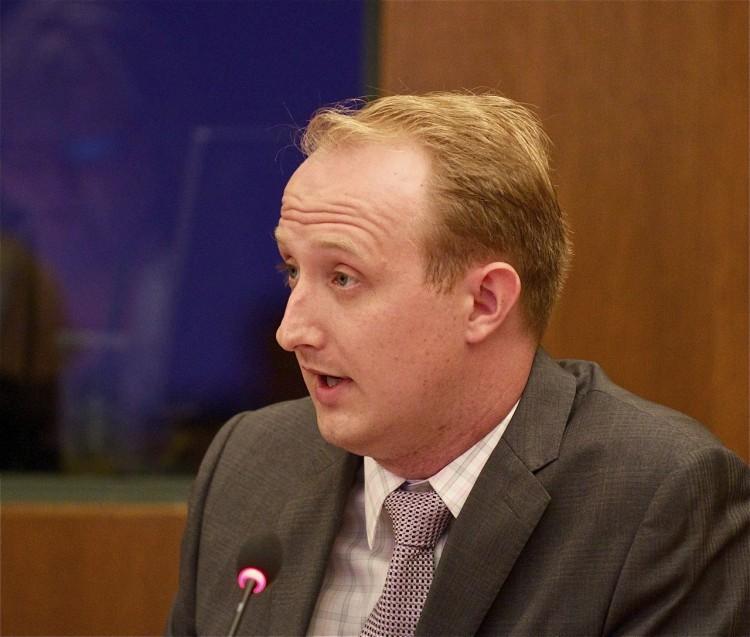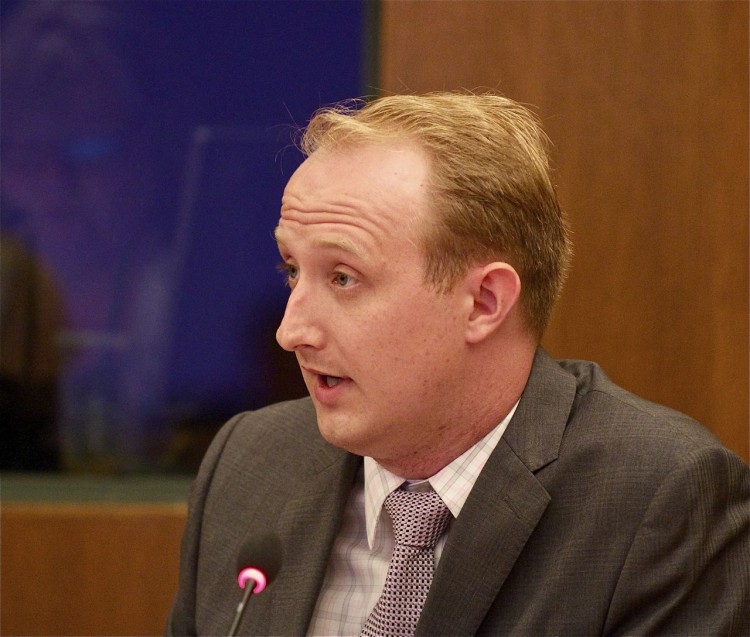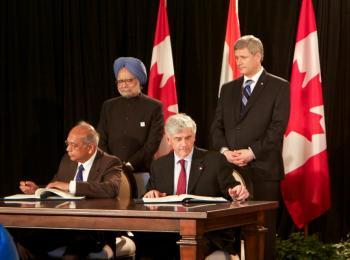If you’re a regular reader of The Epoch Times, you'll know that our columnists have accurately foretold the dramatic events that have been unfolding recently in China. There’s an underlying issue that our journalists understand which allows us to see the current situation with clarity. It explains the sudden and dramatic fall of Bo Xilai. It even provides insight into how and why Google was forced out of China.
I’m going to make what may sound like a bold assertion: that Falun Gong, and the persecution of Falun Gong, is the core issue behind the extraordinary political events we see unfolding in China today. Our failure to understand Falun Gong’s impact and consider it in our relations with China wouldn’t just mean putting human rights on the backburner. It would mean engaging China with our eyes closed.
First, at risk of being seen to downplay the importance of other very serious human rights concerns inside China, I do want to stress that my co-panelist Yiyang Xia will describe how the repressive apparatus developed over the 13 years of persecuting Falun Gong has been used more recently to target human rights defenders of all types.
I have four points I'd like to make.
1. There is a faction in the Chinese Communist Party that has been seeking to overturn settled arrangements and seize power.
The Epoch Times learned about this in February. Wang Lijun was the chief of police for Bo Xilai, who ruled the giant city of Chongqing in central-western China. Wang fled by car to the American consulate in Chengdu, several hours away. Wang had been under investigation by Party central, Bo feared what Wang would reveal, and Bo turned on Wang. Wang was fleeing for his life—not simply to share evidence implicating his boss’s wife in murder. (Having heard from my co-panelist David Matas about Wang’s role in large-scale organ harvesting of Falun Gong practitioners, we can see it’s highly unlikely Wang suddenly grew a conscience and wished to stand up to Bo over the death of Neil Heywood).
Bill Gertz, a US national security reporter, soon reported that Wang Lijun had revealed to U.S. officials that Bo Xilai and Zhou Yongkang were plotting to thwart the ascension to power of Xi Jinping, who is supposed to assume the leadership of the Chinese Communist Party later this year (or early next year, if the Party Congress is delayed).
The alliance between Bo and Zhou was well known. Zhou is the domestic security czar in the Communist Party and he had publicly pushed for Bo to be named to the Standing Committee—the group of nine men who rule the Party and China—and to take his place running everything related to law enforcement in China. Wang revealed there was more to this alliance than meets the eye: after Xi assumed office, Bo and Zhou planned on pushing Xi aside and promoting Bo to the top.
The Epoch Times had its own Chinese sources who affirmed what Gertz had reported, and so did those dissident Chinese-language media who, like The Epoch Times, have accurately reported the unfolding of events in the current political drama.
Further corroboration emerged in a story The Epoch Times broke about why Google was forced out of China. Bo and Zhou wanted to manipulate Internet searches so that information embarrassing to Xi Jinping, as well as Wen Jiabao and Hu Jintao, would be presented. They wanted to use the Internet to weaken them. In order to control the Internet searches, they made a deal with Baidu—Google’s primary China-based search competitor at the time. They would force Google out, Baidu would collect Google’s market share, and then Baidu would tailor Internet searches to suit Bo and Zhou’s agenda.
Indeed, Zhou and Bo succeeded in pushing Google out, and Baidu’s search results for “XiJinping,” “HuJintao” and “WenJiabao” began returning articles with titles like “Hu Jintao’s Son Terribly Corrupt; Jiang Zemin Wants to Get to the Bottom of It,” and “Xi Jinping is a Lecher, Plays with Women in Zhejiang Behind His Second Wife,” and so on.
To sum up: Bo and Zhou sought to seize power through extraordinary means. The media have often reported on the “infighting” in China. The word is misleading. This is not parliamentary maneuvering. It is deadly serious. Before this is over we may well see executions.
2. The decision to persecute Falun Gong forced Jiang Zemin to build an alternative power structure inside the Communist Party.
In 1999 Jiang Zemin began the persecution against Falun Gong. It was a very divisive, controversial thing to have done, and in the end it completely backfired and turned into a nightmare for the Party.
It’s worth looking back to something written soon after that began. In November of 1999, John Pomfret of the Washington Post wrote: “The campaign has revealed dissent at the top echelons of power, undermining the image of China’s leadership as united and pragmatic. Communist Party sources said that the standing committee of the Politburo did not unanimously endorse the crackdown and that President Jiang Zemin alone decided that Falun Gong must be eliminated.”
Consider the enormity of what Jiang decided on his own to do. Between 70 and 100 million people were practicing Falun Gong in 1999. Each of those individuals has families, friends, neighbors, and colleagues. Jiang in effect set the communist party at war against a huge fraction of the Chinese people.
Jiang thought his campaign would be over in three months. When he found that was not the case, he had to improvise. Because his campaign was not popular, Jiang had to recruit officials to carry it out, which he did with bribery, blackmail, and coercion—creating a faction that had direct, personal ties to him.
Jiang had to ensure the persecution would continue. Otherwise, he would have reason to fear his legacy, his freedom, and even his life might be at risk. If the Party once stopped the persecution, then that huge part of the population that had been damaged would demand an accounting be made.
In 2002, when Jiang was scheduled to retire as head of the Communist Party, he expanded the Standing Committee, putting two of his people on it. In addition, he had the Standing Committee change the rule by which it operated. Under him, the rule had been “obey the general secretary.” After he retired, the rule was “work by consensus.” Since Jiang’s people dominated the committee, the effect of these changes was to assure Jiang never gave up power.
In addition to these steps, Jiang built up the Political and Legislative Affairs Committee—or PLAC for short—into a second centre of power within the Party. The PLAC controls every aspect of law enforcement in China, from police to judges, to lawyers, to labour camps, to surveillance. Its People’s Armed Police numbers 1.5 million, the size of an army. Jiang assured all the means of coercion outside of the military were at the command of his allies, giving him and his faction a kind of independence from the communist party itself.
It’s worth pausing to reflect on the sheer cost of an apparatus capable of repressing this number of people—a topic my co-panelist Yiyang Xia will delve into further.
Click www.ept.ms/ccp-crisis to read about the most recent developments in the ongoing crisis within the Chinese communist regime. In this special topic, we provide readers with the necessary context to understand the situation. Get the RSS feed. Get the new interactive Timeline of Events. Who are the Major Players? ![]()
Continued on the next page ... Bo Xilai has been sued in over a dozen countries.
3. The crimes committed in persecuting Falun Gong will, once acknowledged, threaten the existence of the Communist Party.
Bo Xilai has been sued in over a dozen countries for crimes against humanity and genocide. He was indicted by the Spanish National Court in 2009 on charges of genocide and torture.
The best guess is that tens of thousands of practitioners have died from torture and abuse. An estimated 450,000 to 1,000,000 Falun Gong practitioners are locked up in labor camps right now, where they suffer abuse, brainwashing, and torture. Throughout China, families have been shattered. There is an entire generation of orphans who have lost one or both parents to the persecution.
As horrible as all of this is, there is something more horrifying: the evil of forced, live organ harvesting going on in China. Tens of thousands of Falun Gong practitioners have been killed for their organs while still alive.
This has been organized by the PLAC. And leading members of Jiang’s faction are heavily involved.
Wang Lijun has bragged in a speech of overseeing thousands of organ harvesting operations. Shenyang City in Liaoning Province under Bo Xilai appears to have been ground zero for the development of this atrocity. Zhou Yongkang is also heavily involved.
Our paper first broke this story and continues to cover it closely. Last month we reported on phone calls made to top communist party leaders asking about the organ harvesting. None denied knowledge of the organ harvesting from Falun Gong practitioners.
There has been a lot written about whether the Chinese Communist Party might collapse, due to financial problems, corruption, inequality, and so on. What will be the effect on the Communist Party of the publication of the facts about the atrocities of organ harvesting?
We have an instructive example from history.
In 1940, Soviet secret police killed over 20,000 Polish officers at Katyn Forest in Russia. Stalin blamed it on the Nazis, and the regime maintained the lie for the next 50 years. In 1989 the truth emerged, and in 1990 Gorbachev admitted what happened. The massacre was also used in the power struggle between Yeltsin and Gorbachev; it strengthened the Polish resistance and crushed the moral authority of the remaining Soviet hard-liners.
Once something like this is unveiled, there is no going back. The same will be true for China, and the enormous crime of organ harvesting will come to define the Chinese Communist Party.
Let’s go back to the plot planned by Bo and Zhou. Last month, Bo was stripped of all of his Party posts. He has been purged and is under investigation.
The removal of Bo is a crippling blow to the faction that Jiang formed to persecute Falun Gong. Without Bo to take Zhou’s powerful positions on the Standing Committee and as head of the PLAC, the alternative power structure built to protect Jiang and his faction collapses.
The future of China is now open in a way that has not been the case for a long time. This brings me to my fourth and final point.
4. Canada does not need to fear the collapse of the Chinese Communist Party.
Just as Jiang feared for his legacy, so too do Premier Wen Jiabao and Party head Hu Jintao.
Wen and Hu are scheduled to retire at the 18th Party Congress, which will most likely be in October. If they don’t end the persecution of Falun Gong, they will forever be tarred as having been complicit in it.
But ending the persecution requires Hu and Wen take on the strength of the second power centre created by Jiang.
Western countries’ raising of the Falun Gong issue can strengthen the hands of Hu and Wen, as they fight against the rearguard actions of Jiang’s faction. The U.S. government cable made available by Wikileaks supports this, showing that Bo Xilai may have been kept out of the vice-premiership position he was vying for in 2007 because of the Falun Gong lawsuits he faced overseas.
Of course, if Hu and Wen end the persecution, and the crimes committed against Falun Gong are acknowledged, the Communist Party may end as well.
There has been much written about the need for the CCP to provide stability in China—it is a big subject that I can’t do justice to today. Simply consider the following:
In several speeches Wen has said that the government of China should be independent of the Communist Party. This is heresy for those who believe the Communist Party should rule China—the Party can only rule if it has a monopoly of power. When Qiao Shi was head of the National People’s Congress in the late 1990s, he used to say the Party should be subject to the laws of China.
If Wen Jiabao and Qiao Shi can speak composedly about a China in which the Communist Party does not have power over everything, we should not be afraid of the same prospect.
Since this crisis began, the traffic on The Epoch Times Chinese-language website has seen a significant jump—it now gets 6 million page views a day.
I believe the Chinese people are flocking to our website not only because we provide a rare uncensored look at China in the Chinese language, but also because of the insight we provide that makes sense of what is unfolding there today.
We are able to offer that insight because we understand what I’ve outlined here today: The crisis in China turns on the evil of persecuting Falun Gong and its resolution depends on the stance taken toward that evil.
Editor’s Note: This article is based on a talk given by Jason Loftus, Deputy Publisher and Chief Editor of the Canadian English edition of The Epoch Times, at a forum on China held on Parliament Hill on May 30, 2012. The Epoch Times has won national awards in both Canada and the U.S. for its China coverage. The paper has reported ahead of the curve on events unfolding in China, and its Chinese website has had upwards of 6 million hits per day recently due to its coverage of the current political turmoil there. Mr. Loftus is a regular television commentator on China.
The Epoch Times publishes in 35 countries and in 19 languages. Subscribe to our e-newsletter.





